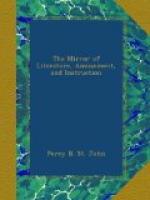At that earlier period of literature when Shakspeare flourished, books were few in number, and consequently scarce; yet there can be no doubt that our author seized every opportunity of improving and strengthening his mind: whether he had any acquaintance with the modern languages is unknown, but he has certainly introduced many French scenes in his works, and he has taken several of his plots, such as that of Romeo and Juliet, from the Italians. As to his own language, he is said to have made the poems of Chaucer principally his study, so that it would not be quite fair to produce any plagiarisms from that writer; but I give the reader a few specimens of English literature taken from other quarters, which seem to have afforded Shakspeare ideas, or else matter, to work upon. The following passage is from one of our oldest dramas, and it will readily call to the recollection of the reader, the celebrated speech of Claudio in Measure for Measure:
“To die is sure to go we know not
whither,
We lie in silent darkness, and we rot.
Perhaps the spirit, which is future life,
Dwells, salamander-like, unharm’d
in fire,
Or else with wand’ring winds is
blown about
The world; but if condemned like those
Whom our uncertain thought imagines howling,
Then the most loath’d and the most
weary life,
Which age, ache, penury or imprisonment
Can lay on nature, is a Paradise.
To what we fear of death.”
The sentences that follow are from a small historical work I have fallen in with, written in old English, but without its date; about a fourth part of the matter contained in this little book is to be found woven into the different historical plays of Shakspeare, but the underwritten extracts are very nearly in his own words, allowing, of course, for the more poetical expression.
(Fall of Wolsey.) “Being near his end, he called Sir William Kingston to him, and said, ’Pray, present my duty to his majesty, who is a noble and gallant prince, and of a resolved mind, for he will venture the loss of his kingdom, rather than be contradicted in his desires. And now, Mr. Kingston, had I but served my God as diligently as I have served the king, he never would have forsaken me in my grey hairs!’” (Compare this with Cardinal Wolsey’s speech to Cromwell, Henry VIII., Act iii.)
Amongst other particulars in this book, concerning Richard III. we have the following: “The Protector coming in council, seemed more than ordinarily merry, and after some other discourses, ’My lord (says he to the Bishop of Ely) you have very good strawberries in your garden in Holborn, pray let us have a dish of them.’ ‘With all my heart,’ replied the bishop, and sent for some. Afterwards, the Protector knit his brows and his lips, and rising up in great wrath, he exclaimed, ’My lords, I have to tell you, that that old sorceress, my brother Edward’s widow, and her partner, that common prostitute, Jane Shore, have by witchcraft and enchantment been contriving to take away my life, and though by God’s mercy they have not been able to finish this villany, yet see the mischief they have done me; (and then he showed his left arm,) how they have caused this dear limb of mine to wither and grow useless.’” (Vide Richard III. Act iii. Scene 2.)




